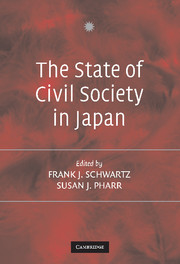Book contents
- Frontmatter
- Contents
- Tables and Figures
- Contributors
- Preface
- The State of Civil Society in Japan
- PART I CONTEXT
- 1 What Is Civil Society?
- 2 From Meiji to Heisei: The State and Civil Society in Japan
- 3 Capitalism and Civil Society in Postwar Japan: Perspectives from Intellectual History
- PART II THE ASSOCIATIONAL SPHERE
- PART III THE NONMARKET ACTIVITIES OF ECONOMIC ACTORS
- PART IV STATE-CIVIL SOCIETY LINKAGES
- PART V GLOBALIZATION AND VALUE CHANGE
- Bibliography
- Author Index
- Subject Index
3 - Capitalism and Civil Society in Postwar Japan: Perspectives from Intellectual History
Published online by Cambridge University Press: 05 July 2014
- Frontmatter
- Contents
- Tables and Figures
- Contributors
- Preface
- The State of Civil Society in Japan
- PART I CONTEXT
- 1 What Is Civil Society?
- 2 From Meiji to Heisei: The State and Civil Society in Japan
- 3 Capitalism and Civil Society in Postwar Japan: Perspectives from Intellectual History
- PART II THE ASSOCIATIONAL SPHERE
- PART III THE NONMARKET ACTIVITIES OF ECONOMIC ACTORS
- PART IV STATE-CIVIL SOCIETY LINKAGES
- PART V GLOBALIZATION AND VALUE CHANGE
- Bibliography
- Author Index
- Subject Index
Summary
In postwar Japan's intellectual world, discussion of civil society has been inseparable from the tradition of Marxian thought and from debates about the nature of Japanese capitalism and, more broadly, about the significance of the imperial System and its failure for Japan's historical development. Such was the context in which the explicit discussion, and advocacy, of civil society as such began early in the postwar years. But for reasons explored here, these discussions reached critical mass only in the 1960s, leaving a considerable “afterlife” as well. The seemingly intractable malaise that has marked the Heisei era (1989-) in its turn has prompted a reconsideration of that earlier episode, but what legacy did that long-ago efflorescence leave to those now witnessing the apparent decay of Japan's postwar order?
Civil Society: Promise and Problem
The redoubtable dictionary Kōjien defines civil society (shimin shakai) as a “modern society composed of free and equal individuals, having abolished all privileges, control by Status or relations of Subordination. Advocated in the 17th and 18th centuries by Locke and Rousseau.” In other words, the notion of civil society was European in origin and had to be translated, indigenized. Did that happen? Did the translated term itself come to refer, for a broad generality of Japanese, to something identifiable in their own experience and political Weltanschauung?
Allow me to sketch an answer. The “revolutionary Restoration” of 1868, the narrative would begin, did nothing if not create the political and legal framework, the formal preconditions, for such a society.
- Type
- Chapter
- Information
- The State of Civil Society in Japan , pp. 63 - 80Publisher: Cambridge University PressPrint publication year: 2003
- 4
- Cited by



